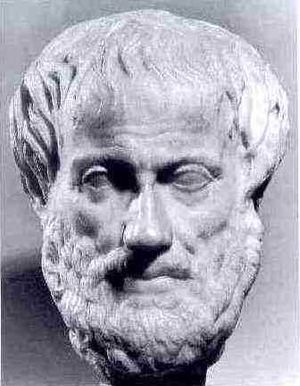Aristotle: Difference between revisions
No edit summary |
No edit summary |
||
| Line 2: | Line 2: | ||
'''Aristotle''' ({{Greek|Ἀριστοτέλης}}, * 384 BC in [[w:Stagira (ancient city)|Stagira]] / [[w:Macedonia (ancient kingdom)|Macedonia]], † 322 BC in [[w:Chalcis|Chalcis]] / [[w:Euboea|Euboea]]) was a Greek [[philosopher]], natural scientist and one of the most influential thinkers in Western intellectual history, who either founded or decisively influenced numerous disciplines himself. After his origin, Aristotle was also called ''The Stagirite'' and later simply ''The Philosopher''. | '''Aristotle''' ({{Greek|Ἀριστοτέλης}}, * 384 BC in [[w:Stagira (ancient city)|Stagira]] / [[w:Macedonia (ancient kingdom)|Macedonia]], † 322 BC in [[w:Chalcis|Chalcis]] / [[w:Euboea|Euboea]]) was a Greek [[philosopher]], natural scientist and one of the most influential thinkers in Western intellectual history, who either founded or decisively influenced numerous disciplines himself. After his origin, Aristotle was also called ''The Stagirite'' and later simply ''The Philosopher''. | ||
== Life == | |||
Aristotle was born in Stageira in 384 BC, the son of Nicomachus. His father was personal physician at the court of King Amyntas II of Macedonia. In 367 BC, at the age of 17, Aristotle entered the [[w:Platonic Academy|Platonic Academy]] in [[w:Athens|Athens]] and studied there for 20 years. | |||
[[Plato]] died in 347 BC. The Academy is headed by Speusippos, a nephew of Plato, rather than the obviously more gifted and talented Aristotle. This is due to the fact that Aristotle was a metic, had no citizenship rights in Athens and therefore could not take over the Academy. Aristotle followed the call of the tyrant Hermias of Atarneus in Asia Minor, who was also a student of Plato and at the same time a vassal of the Persian king. Aristotle married the niece of the city prince Pytias and founded a school in Atarneus (Diogenes Laertios, 5,3 f.). From 343 BC to 336 BC, Aristotle was commissioned by the [[w:Macedonia (ancient kingdom)|Macedonian]] king [[Philip II of Macedon|Philip II]] to teach his son [[Alexander the Great]]. | |||
In 335 BC Aristotle returned to Athens and founded his own school, the Lykeion (later also called Peripatos). This existed until about 40 BC and the philosophical direction of the Peripatetics emerged from it. In 323 BC Aristotle left Athens, because after Alexander's death the anti-Macedonian party gained the upper hand and Aristotle was accused of impiety. He flees to Chalkis, the birthplace of his mother, where he dies the following year (Diog. Laert. 5,6 ff). | |||
== See also == | == See also == | ||
Revision as of 16:23, 30 January 2022

Aristotle (Greek: Ἀριστοτέλης, * 384 BC in Stagira / Macedonia, † 322 BC in Chalcis / Euboea) was a Greek philosopher, natural scientist and one of the most influential thinkers in Western intellectual history, who either founded or decisively influenced numerous disciplines himself. After his origin, Aristotle was also called The Stagirite and later simply The Philosopher.
Life
Aristotle was born in Stageira in 384 BC, the son of Nicomachus. His father was personal physician at the court of King Amyntas II of Macedonia. In 367 BC, at the age of 17, Aristotle entered the Platonic Academy in Athens and studied there for 20 years.
Plato died in 347 BC. The Academy is headed by Speusippos, a nephew of Plato, rather than the obviously more gifted and talented Aristotle. This is due to the fact that Aristotle was a metic, had no citizenship rights in Athens and therefore could not take over the Academy. Aristotle followed the call of the tyrant Hermias of Atarneus in Asia Minor, who was also a student of Plato and at the same time a vassal of the Persian king. Aristotle married the niece of the city prince Pytias and founded a school in Atarneus (Diogenes Laertios, 5,3 f.). From 343 BC to 336 BC, Aristotle was commissioned by the Macedonian king Philip II to teach his son Alexander the Great.
In 335 BC Aristotle returned to Athens and founded his own school, the Lykeion (later also called Peripatos). This existed until about 40 BC and the philosophical direction of the Peripatetics emerged from it. In 323 BC Aristotle left Athens, because after Alexander's death the anti-Macedonian party gained the upper hand and Aristotle was accused of impiety. He flees to Chalkis, the birthplace of his mother, where he dies the following year (Diog. Laert. 5,6 ff).
See also
Literature
- Rudolf Steiner: Die Rätsel der Philosophie in ihrer Geschichte als Umriß dargestellt, GA 18 (1985), ISBN 3-7274-0180-X; Tb 610/11, ISBN 978-3-7274-6105-7 English: rsarchive.org German: pdf pdf(2) html mobi epub archive.org
 |
References to the work of Rudolf Steiner follow Rudolf Steiner's Collected Works (CW or GA), Rudolf Steiner Verlag, Dornach/Switzerland, unless otherwise stated.
Email: verlag@steinerverlag.com URL: www.steinerverlag.com. Index to the Complete Works of Rudolf Steiner - Aelzina Books A complete list by Volume Number and a full list of known English translations you may also find at Rudolf Steiner's Collected Works Rudolf Steiner Archive - The largest online collection of Rudolf Steiner's books, lectures and articles in English. Rudolf Steiner Audio - Recorded and Read by Dale Brunsvold steinerbooks.org - Anthroposophic Press Inc. (USA) Rudolf Steiner Handbook - Christian Karl's proven standard work for orientation in Rudolf Steiner's Collected Works for free download as PDF. |
